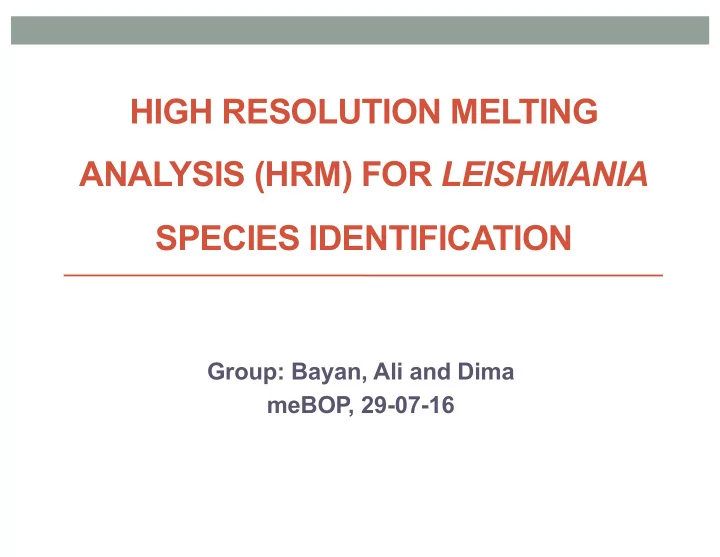

HIGH RESOLUTION MELTING ANALYSIS (HRM) FOR LEISHMANIA SPECIES IDENTIFICATION Group: Bayan, Ali and Dima meBOP, 29-07-16
High Resolution Melting (HRM) analysis • New post-PCR analysis method used to identify variations in nucleic acid sequences. • Detection of small differences in PCR melting curves. • It is enabled by improved dsDNA-binding dyes used in conjunction with real-time PCR instrumentation.
qPCR Results for DNA amplification of Blood samples Real-time LightCycler PCR assay for 20 samples using primers JW13 and JW14 amplifying a DNA fragment from the kinetoplast DNA (Nicolas et al. 2002) 5.0 4.5 Fluorescence 4.0 3.5 Control + 3.0 2.5 2.0 1.5 Samples 1.0 Control - 0.5 5 10 15 20 25 30 35 40 Cycle
qPCR Results for DNA amplification of Blood samples Control + 5.0 4.5 4.0 Fluorescence 3.5 3.0 2.5 2.0 1.5 1.0 0.5 5 10 15 20 25 30 35 40 Cycle Cycle
Data acquisition 100 90 80 70 Fluorescence 60 50 40 30 20 10 0 65 66 67 68 69 70 71 72 73 74 75 76 77 78 79 80 81 82 83 84 85 86 87 88 89 90 deg. Temperature
Melting curve analysis for species identification Real-time LightCycler PCR assay using primers JW13 and JW14 amplifying a DNA fragment from the kinetoplast DNA 1.2 1.0 0.8 dF/dT 0.6 0.4 0.2 0.0 66 67 68 69 70 71 72 73 74 75 76 77 78 79 80 81 82 83 84 85 86 87 88 89 90 deg.
L. donovani L. major: 83.86 L. donovani : 87.12 L. tropica : 88.89 L. infantum : 89.21 – 89.47 L. major L. tropica
Advantages of HRM • Low reagent consumption • (requires only PCR reaction volume (20 µL) for analysis of each sample). • Simple, fast workflow: • no additional instrumentation is required after PCR amplification. • Low sample consumption: • Following HRM analysis, the PCR amplicon can be used directly in a Sanger sequencing reaction
Disadvantages of HRM • Limited sensitivity. • Limited to genes characterized by low rate of mutations • Returning to others methods in case of co-infection.
Recommend
More recommend